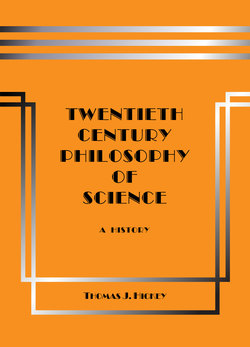Читать книгу Twentieth-Century Philosophy of Science: A History (Third Edition) - Thomas J. Hickey - Страница 20
На сайте Литреса книга снята с продажи.
Discovery:
ОглавлениеPositivists believed that empirical laws are inferentially discovered by inductive generalization based on repeated observations.
They define empirical laws as universally quantified statements containing only “observation terms” describing observable entities and/or phenomena.
Early positivists such as Ernst Mach recognized only empirical laws for valid scientific explanations. But after Einstein’s achievements neopositivists such as Rudolf Carnap recognized hypothetical theories for valid scientific explanations, if the theories could be linguistically related to language used to report the relevant observations.
Positivists believed that theories are discovered by creative imagination, but they left unexplained the creative process of developing theories.
The neopositivists define theories as universally quantified statements containing any “theoretical terms”, i.e., terms that do not describe observable entities or phenomena.
